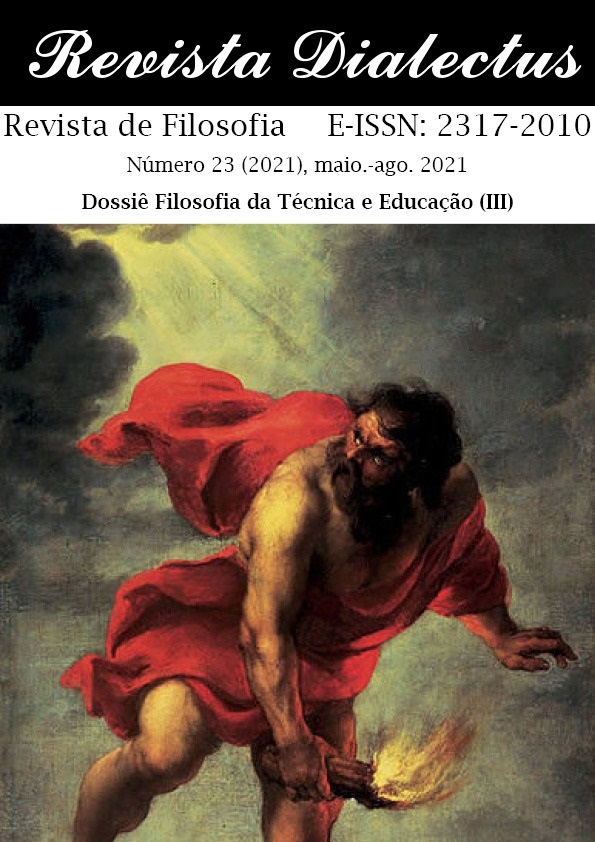OS USOS DA TECNOLOGIA COMO MECANISMO BIOPOLÍTICO
DOI:
https://doi.org/10.30611/2021n23id71859Keywords:
Tecnologia, Biopolítica, Ética, Máquinas InteligentesAbstract
O presente artigo busca problematizar os impactos dos usos da tecnologia no que se refere ao desenvolvimento social. Ou seja, compreender quais as consequências das chamadas máquinas inteligentes e das ferramentas de informação e gestão utilizadas para a administração das relações e das produções na contemporaneidade. Esses usos serão tematizados a partir de Feenberg pela discussão do envolvimento tecnológico com o mundo e da mudança de nossa perspectiva de abordagem, entendimento e relacionamento com a realidade em função desse novo modo; e a partir de Foucault, discutindo os usos da tecnologia como parte de um fazer político orientado para o atendimento das demandas mercadológicas, que repercute em controle subjetivo e não administração dos problemas da realidade. Como resultado do artigo se apresenta a necessidade da aplicação da perspectiva ética como condição para qualificação dos usos da tecnologia e seu o comprometimento com os processos de emancipação humana.
References
CAMILO, Juliana Aparecida de Oliveira e FURTADO, Rafael Nogueira. O conceito de biopoder no pensamento de Michel Foucault. Revista Subjetividades, vol.16 n. 3 - Fortaleza / Dezembro de 2016. Disponível em http://pepsic.bvsalud.org/scielo.php?script=sci_arttext&pid=S2359-07692016000300003.
CASSIANO, Jeferson Martins. Fazer produzir e deixar consumar: as tecnologias de poder em Michel Foucault. Ipseitas, São Carlos, 2016, vol. 2, n. 2, p. 154-177.
DEBORD, Guy. A sociedade do espetáculo. Rio de Janeiro: Contraponto, 1997. 238 p.
DOMINGOS, Pedro. O algoritmo mestre. São Paulo: Novatec Editora, 2017.
DURÁN, Juan Manuel. Ciencia de la computación y filosofía. Epistemology and Logic Research Group, Federal University of Santa Catarina (UFSC), Brazil, 2018. 227 p. Disponível em : https://www.researchgate.net/publication/330642140_Ciencia_de_la_computacion_y_filosofia_unidades_de_analisis_del_software
FEENBERG, Andrew. Tecnologia, modernidade e democracia. Org. e Trad. Eduardo Boeira. MIT Portugal, 2015. 233 p. Disponível em https://www.sfu.ca/~andrewf/TECNOLOGIA_MODERNIDADE_DEMOCRACIA.pdf.
_________. Ciencia, tecnología y democracia: distinciones y conexiones. Revista Latino-Americana de Filosofia e História da Ciência. São Paulo, v. 7, n. 1, março de 2009. 184 p.
FEENBERG, Andrew. A teoria crítica de Andrew Feenberg: racionalização democrática, poder e tecnologia. Org. e Trad. Ricardo T. Neder. Brasília: Observatório do Movimento pela Tecnologia Social na América Latina/CDS/UNB/Capes, 2010.
FRANSSEN, Maarten, LOKHORST, Gert-Jan and VAN DE POEL, Ibo. Philosophy of Technology. The Stanford Encyclopedia of Philosophy (Fall 2018 Edition), Edward N. Zalta (ed.), forthcoming. https://plato.stanford.edu/archives/fall2018/entries/technology/.
FOUCAULT, Michel. Microfísica do poder. 4a ed. Rio de Janeiro: Edições Graal, 1984.
________________. Nascimento da biopolítica. São Paulo: Martins Fontes, 2008.
LUGER, George F. Inteligência Artificial. Estruturas e estratégias para a solução de problemas complexos. 4ª ed. Porto Alegre: Boookmann, 2004. 774 p.
MACCARTHY, Jonh. The philosophy of AI and the AI of philosophy. Stanford University – Computer Science Department. 2006. Disponível em http://jmc.stanford.edu/articles/aiphil2.html.
________________. Some philosophical problems from the standpoint of artificial intelligence. Computer Science Department, 1969. Disponível em http://www-formal.stanford.edu/jmc/mcchay69.ps.
MACKENZIE, Adrian. Machine learners: archaeology of a data practice. Cambridge, MA: The MIT Press, 2017. 267 p.
MARX, Karl. O capital.
Disponível em https://www.marxists.org/portugues/marx/1867/ocapital-v1/index.htm. Versão HTML por José Braz, 2005.
MITCHELL, Tom Michael. Machine Learning. United States: McGraw-Hill International Editions, 1997, 413 p.
NOVAES, Henrique; DAGNINO, Renato. The fetish of technology. Revista ORE & DEMO (Marília), v.5, n.2, p. 189-210, 2004.
O´NEIL, Cathy. Weapons of math destruction: how big data increases inequality and threatens democracy. New York: Crown Publishers, 2016. Disponível em https://we.riseup.net/assets/404114/Weapons+of+Math+Destruction+Cathy+O%27Neil.pdf.
Downloads
Published
Issue
Section
License
Authors who publish in this journal agree to the following terms:
- Authors retain the copyright and grant the journal the right of first publication, with the work simultaneously licensed under the Attribution-NonCommercial-NoDerivatives 4.0 International (CC BY-NC-ND 4.0) License, which allows the non-commercial sharing of work, without modifications and with acknowledgment of authorship and initial publication in this journal.
- Authors are authorized to take additional contracts separately, for non-exclusive distribution of the version of the work published in this journal (eg publish in institutional repository or as a book chapter), with acknowledgment of authorship and initial publication in this journal.
- Authors are allowed and encouraged to publish and distribute their work online (eg in institutional repositories or on their personal page) at any point before or during the editorial process, as this can generate productive changes as well as increase the impact and citation of published work (See The Free Access Effect).



















